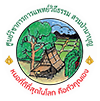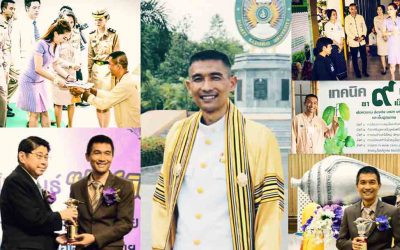ศึกษาการประยุกต์ใช้หลักอริยสัจ 4 ในชีวิตประจำวันตามแนวแพทย์วิถีธรรม
นางสาวเสริมศรี ชวานิสากุล
วิทยานิพนธ์นี้เป็นส่วนหนึ่งของการศึกษา ตามหลักสูตรปริญญาพุทธศาสตรมหาบัณฑิต
สาขาวิชาพระพุทธศาสนา บัณฑิตวิทยาลัย
มหาวิทยาลัยมหาจุฬาลงกรณราชวิทยาลัย
พุทธศักราช ๒๕๖๕
(ลิขสิทธิ์เป็นของมหาวิทยาลัยมหาจุฬาลงกรณราชวิทยาลัย)
บทคัดย่อ
งานวิจัยนี้มีวัตถุประสงค์ 3 ประการ
1) เพื่อศึกษาหลักอริยสัจ 4 ในพระพุทธศาสนา
2) เพื่อศึกษาการประยุกต์ใช้หลักอริยสัจ 4 ในชีวิตประจำวันตามแนวแพทย์วิถีธรรม
3) เพื่อวิเคราะห์การประยุกต์ใช้หลักอริยสัจ 4 ในชีวิตประจำวันตามแนวแพทย์วิถีธรรม เป็นงานวิจัยเชิงคุณภาพ แบบการวิจัยเอกสาร ร่วมกับการสัมภาษณ์เชิงลึก ผลการวิจัยพบว่า
หลักอริยสัจ 4 เป็นความจริงอันประเสริฐซึ่งยังปุถุชนผู้ปฏิบัติตามมรรค 8 ให้เป็นอริยะ มี 4 ประการ ได้แก่
(1) ทุกขอริยสัจ คือ อาการไม่สุขสมใจในอารมณ์ต่างๆ
(2) ทุกขสมุทยอริยสัจ คือ ความอยากที่ร่วมด้วยความกำหนัดยินดีในอารมณ์นั้น
(3) ทุกขนิโรธอริยสัจ คือ การละความอยากที่ร่วมด้วยความกำหนัดยินดีในอารมณ์นั้น
(4) ทุกขนิโรธคามินีปฏิปทาอริยสัจ คือ การปฏิบัติศีลด้วยปัญญาอย่างตั้งมั่น เพื่อละความกำหนัดในอารมณ์นั้น
การประยุกต์ใช้หลักอริยสัจ 4 ในชีวิตประจำวันของแพทย์วิถีธรรม มีแนวคิดว่าการเกิดเป็นทุกข์ ชีวิตที่ไม่รู้ทางพ้นทุกข์จึงต้องทุกข์ไม่สิ้นสุด ผู้มีปัญญาจะรู้ว่า สิ่งที่มีค่าที่สุดในชีวิต คือ ความพ้นทุกข์ ซึ่งเหตุแห่งกองทุกข์ทั้งมวล ก็คือ ความอยากแบบยึดมั่นถือมั่น คนที่เข้าใจเรื่องของกรรมและวิบากกรรมอย่างแจ่มแจ้งได้จริงเท่านั้น จึงจะสามารถละ บรรเทา ทำให้หมดสิ้นไปซึ่งความอยากแบบยึดมั่นถือมั่นอันเป็นเหตุแห่งกองทุกข์ทั้งหมดทั้งมวลในชีวิตได้ โดยเริ่มจากการปฏิบัติศีลไปเป็นลำดับ
การประยุกต์ใช้หลักอริยสัจ 4 ในชีวิตประจำวันตามแนวแพทย์วิถีธรรม มีความสอดคล้องตามหลักอริยสัจ 4 ในพระพุทธศาสนา เพราะมุ่งการดับทุกข์ที่ใจเป็นหลัก โดยการปฏิบัติศีลด้วยปัญญาอย่างตั้งมั่น จนกระทั่งละความอยากแบบยึดมั่นถือมั่นได้ ทำให้เกิดปัญญารู้ชัดว่าความอยากแบบยึดมั่นถือมั่นเป็นเหตุให้เกิดทุกข์ทั้งหมดทั้งมวลตัวจริง
A Study of Application of the Four Noble Truth in Daily Life of the Buddhist Dhamma Medicine
Miss Seamsri Chawanisakul
A Thesis Submitted in Partial Fulfillment of the Requirements for the Degree of Master of Arts (Buddhist Studies)
Graduate School
Mahachulalongkornrajavidyalaya University C.E. 2022
(Copyright by Mahachulalongkornrajavidyalaya University)
ABSTRACT
The aims of this research paper were to study the Four Noble Truths in Buddhism, to examine how the Four Noble Truths are used in daily life according to Buddhist Dhamma Medicine, and to assess how the Four Noble Truths are applied in daily life according to Buddhist Dhamma Medicine. This is a qualitative study based on literature and in-depth interviews.
According to the research, the Four Noble Truths in Buddhism are four things that ordinary people who practice the Noble Eightfold Path must understand: suffering or unsatisfactoriness, the cause of suffering or origin of suffering, the cessation of suffering or extinction of suffering, and the path leading to the cessation of suffering.
According to Buddhist Dhamma Medicine, the Four Noble Truths should be used in daily life. There is a perception that the enlightened will see that the most valuable thing in life is suffering liberty. Clinging to want is the source of all sorrow in the world. Only those who have a thorough understanding of the subject of karma and result of karma will be able to eliminate, relieve, and eliminate the clinging desire that is the source of all of life’s suffering. Starting with the orderly practice of precepts.
The application of the Four Noble Truths in daily life by Buddhist Dhamma Medicine is congruent with the Four Noble Truths’ ideas in Buddhism, because it focuses primarily on the mental cessation of suffering, by practicing the precepts with wisdom and concentration until you let go of your steadfast desire, causing wisdom to know clearly that the clinging desire is the actual cause of all suffering.
วิธีใช้ Embed PDF
- กรุณากดลูกศร ซ้าย-ขวา ในการเปลี่ยนหน้า
- ถ้าหากตัวอักษรเล็ก-ใหญ่เกินไป กรุณากดเครื่องหมาย บวก-ลบ เพื่อปรับขยาย-ลดตัวอักษร


